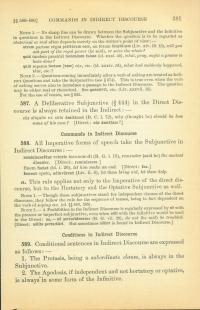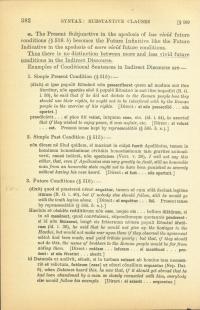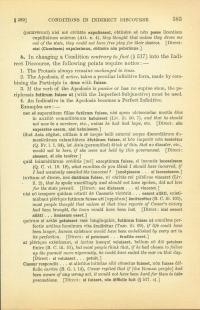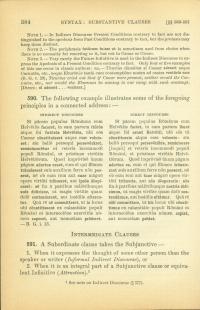589. Conditional sentences in Indirect Discourse are expressed as follows.
- The Protasis, being a subordinate clause, is always in the Subjunctive.
- The Apodosis, if independent and not hortatory or optative, is always in some form of the Infinitive.
a. The Present Subjunctive in the apodosis of Future Less Vivid conditions (§ 516.b) becomes the Future Infinitive like the Future Indicative in the apodosis of Future More Vivid conditions. Thus there is no distinction between Future More and Less Vivid conditions in the Indirect Discourse. Examples of Conditional Sentences in Indirect Discourse are—
-
Simple Present Condition (§ 515).
(Dīxit) sī ipse populō Rōmānō nōn praescrīberet quem ad modum suō iūre ūterētur, nōn oportēre sēsē ā populō Rōmānō in suō iūre impedīrī (B. G. 1.36) (He said) that if he did not dictate to the Roman people how they should use their rights, he ought not to be interfered with by the Roman people in the exercise of his rights. [Direct: sī nōn praescrībō ... nōn oportet]
Praedicāvit . . . sī pāce ūtī velint, inīquum esse, etc. (id. 1.44) He asserted that if they wished to enjoy peace, it was unfair, etc. [Direct: sī volunt . . . est; Present tense kept by repraesentātiō (§ 585.b, Note).]
-
Simple Past Condition (§ 515).
Nōn dīcam nē illud quidem, sī maximē in culpā fuerit Apollōnius, tamen in hominem honestissimae cīvitātis honestissimum tam graviter animadvertī, causā indictā, nōn oportuisse. (Verr. 5.20) I will not say this either, that, even if Apollonius was very greatly in fault, still an honorable man from an honorable state ought not to have been punished so severely without having his case heard. [Direct: Sī fuit . . . nōn oportuit]
-
Future Conditions (§ 516).
(Dīxit) quod sī praetereā nēmō sequātur, tamen sē cum sōlā decimā legiōne itūrum (B. G. 1.40) But (he said) if nobody else should follow, still he would go with the tenth legion alone. [Direct: sī sequētur . . . ībō; Present tense by repraesentātiō (§ 585.b, Note).]
(Dixit) Haeduīs sē obsidēs redditūrum nōn esse, neque eīs . . . bellum illātūrum, sī in eō manērent, quod convēnisset, stipendiumque quotannīs penderent: sī id nōn fēcissent, longē eīs frāternum nōmen populī Rōmānī āfutūrum. (id. 1.36) (He said) that he would not give up the hostages to the Haedui, but would not make war upon them if they observed the agreement which had been made, and paid tribute yearly; but that, if they should not do this, the name of brothers to the Roman people would be far from aiding them. [Direct: reddam . . . īnferam . . . sī manēbunt . . . pendent: sī nōn fēcerint . . . aberit]
Id Datamēs ut audīvit, sēnsit, sī in turbam exīsset ab homine tam necessāriō sē relictum, futūrum [esse] ut cēterī cōnsilium sequantur (Nep. Dat. 6) When Datames heard this, he saw that, if it should get abroad that he had been abandoned by a man so closely connected with him, everybody else would follow his example. [Direct: sī exierit . . . sequentur]
(Putāvērunt) nisi mē cīvitāte expulissent, obtinēre sē nōn posse licentiam cupiditātum suārum. (Att. 10.4) They thought that unless they drove me out of the state, they could not have free play for their desires. [Direct: nisi (Cicerōnem) expulerimus, obtinēre nōn poterimus.]
b. In changing a Condition Contrary to Fact (§ 517) into the Indirect Discourse, the following points require notice:
- The Protasis always remains unchanged in tense.
- The Apodosis, if active, takes a peculiar infinitive form, made by combining the Participle in -ūruswith fuisse.
- If the verb of the Apodosis is passive or has no supine stem, the periphrasis futūrum fuisse ut (with the Imperfect Subjunctive) must be used.
- An Indicative in the Apodosis becomes a Perfect Infinitive.
Examples are:
nec sē superstitem fīliae futūrum fuisse, nisi spem ulcīscendae mortis êius in auxiliō commīlitōnum habuisset (Liv. 3.50.7) and that he should not now be a survivor, etc., unless he had had hope, etc. [Direct: nōn superstes essem, nisi habuissem]
Illud Asia cōgitet, nūllam ā sē neque bellī externī neque discordiārum domesticārum calamitātem āfutūram fuisse, sī hōc imperiō nōn tenērētur. (Q. Fr. 1.1.34) Let Asia (personified) think of this, that no disaster, etc., would not be hers, if she were not held by this government.
[Direct: abesset, sī nōn tenērer]
Quid inimīcitiārum crēditis [mē] exceptūrum fuisse, sī īnsontīs lacessīssem? (Q. C. 6.10.18) What enmities do you think I should have incurred, if I had wantonly assailed the innocent? [excēpissem . . . sī lacessīssem]
invītum sē dīcere, nec dictūrum fuisse, nī cāritās reī pūblicae vinceret (Liv. 2.2) that he spoke unwillingly and should not have spoken, did not love for the state prevail [Direct: nec dīxissem . . . nī vinceret]
Nisi eō tempore quīdam nūntiī dē Caesaris victōriā . . . essent allātī, exīstimābant plērīque futūrum fuisse utī [oppidum] āmitterētur. (B. C. 3.101) Most people thought that unless at that time reports of Cæsar's victory had been brought, the town would have been lost. [Direct: nisi essent allātī . . . āmissum esset]
Quōrum sī aetās potuisset esse longinquior, futūrum fuisse ut omnibus perfectīs artibus hominum vīta ērudīrētur. (Tusc. 3.69) If life could have been longer, human existence would have been embellished by every art in its perfection. [Direct: sī potuisset . . . ērudīta esset]
At plērīque exīstimant, sī ācrius īnsequī voluisset, bellum eō diē potuisse fīnīre. (B. C. 3.51) But most people think that, if he had chosen to follow up the pursuit more vigorously, he could have ended the war on that day. [Direct: sī voluisset . . . potuit]
Caesar respondit . . . sī alicûius iniūriae sibi cōnscius fuisset, nōn fuisse difficile cavēre. (B. G. 1.14) Cæsar replied that if [the Roman people] had been aware of any wrong act, it would not have been hard for them to take precautions. [Direct: sī fuisset, nōn difficile fuit (§ 517.c).]
Note 1— In Indirect Discourse Present Conditions contrary to fact are not distinguished in the apodosis from Past Conditions contrary to fact, but the protasis may keep them distinct.
Note 2— The periphrasis futūrum fuisse ut is sometimes used from choice when there is no necessity for resorting to it, but not in Cæsar or Cicero.
Note 3— Very rarely the Future Infinitive is used in the Indirect Discourse to express the Apodosis of a Present Condition contrary to fact. Only four or five examples of this use occur in classic authors.
Titurius clāmābat sī Caesar adessetneque Carnutēs, etc., neque Eburōnēs tantā cum contemptiōne nostra ad castra ventūrōs esse. (B. G. 5.29) Titurius cried out that if Cæsar were present, neither would the Carnutes, etc., nor would the Eburones be coming to our camp with such contempt. [Direct: sī adesset . . . venīrent]
590. The following example illustrates some of the foregoing principles in a connected address.
|
INDIRECT DISCOURSE |
DIRECT DISCOURSE |
|
Sī pācem populus Rōmānus cum Helvētiīs faceret, in eam partem itūrōs atque ibi futūrōs Helvētiōs, ubi eōs Caesar cōnstituisset atque esse voluisset: sīn bellō persequī persevērāret, reminīscerētur et veteris incommodī populī Rōmānī, et prīstinae virtūtis Helvētiōrum. Quod imprōvīsō ūnum pāgum adortus esset, cum eī quī flūmen trānsīssent suīs auxilium ferre nōn possent, nē ob eam rem aut suae māgnō opere virtūtī tribueret, aut ipsōs dēspiceret: sē ita ā patribus mâiōribusque suīs didicisse, ut magis virtūte quam dolō contenderent, aut īnsidiīs nīterentur. Quā rē nē committeret, ut is locus ubi cōnstitissent ex calamitāte populī Rōmānī et interneciōne exercitūs nōmen caperet, aut memoriam prōderet. —B. G. 1.13. |
Sī pācem populus Rōmānus cum Helvētiīs faciet, in eam partem ībunt atque ibi erunt Helvētiī, ubi eōs tū cōnstitueris atque esse volueris: sīn bellō persequī persevērābis, reminīscere [inquit] et veteris incommodī populī Rōmānī, et prīstinae virtūtis Helvētiōrum. Quod imprōvīsō ūnum pāgum adortus es, cum eī quī flūmen trānsierant suīs auxilium ferre nōn possent, nē ob eam rem aut tuae māgnō opere virtūtī tribueris, aut nōs dēspexeris: nōs ita ā patribus mâiōribusque nostrīs didicimus, ut magis virtūte quam dolō contendāmus, aut īnsidiīs nītāmur. Quā rē nōlī committere, ut hīc locus ubi cōnstitimus ex calamitāte populī Rōmānī et interneciōne exercitūs nōmen capiat, aut memoriam prōdat. |




